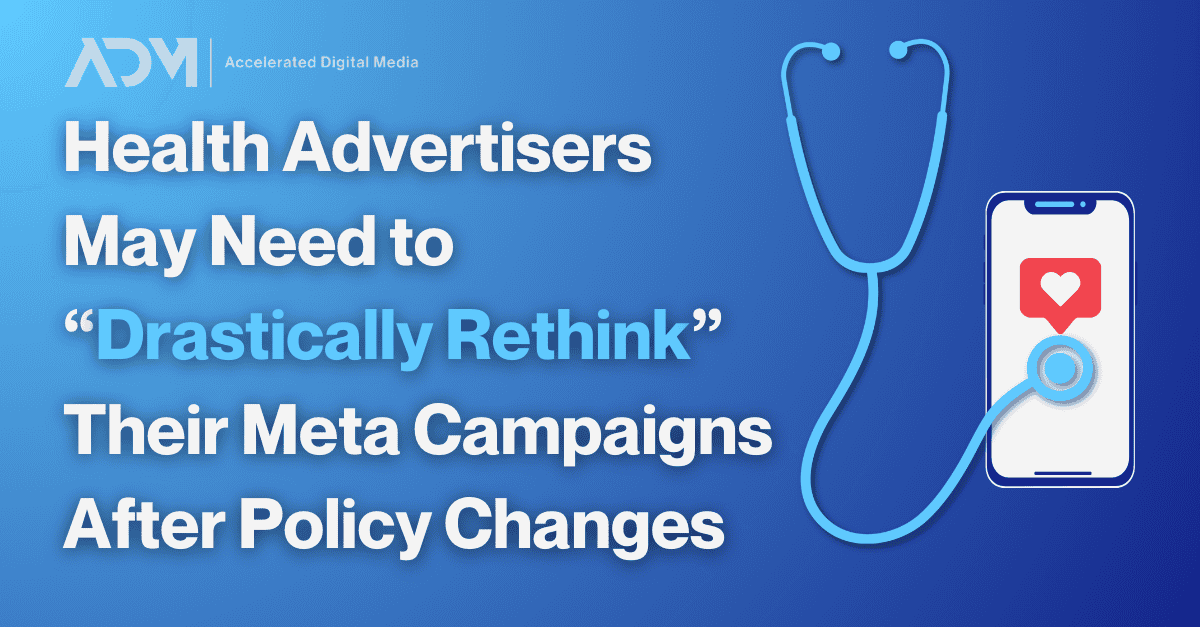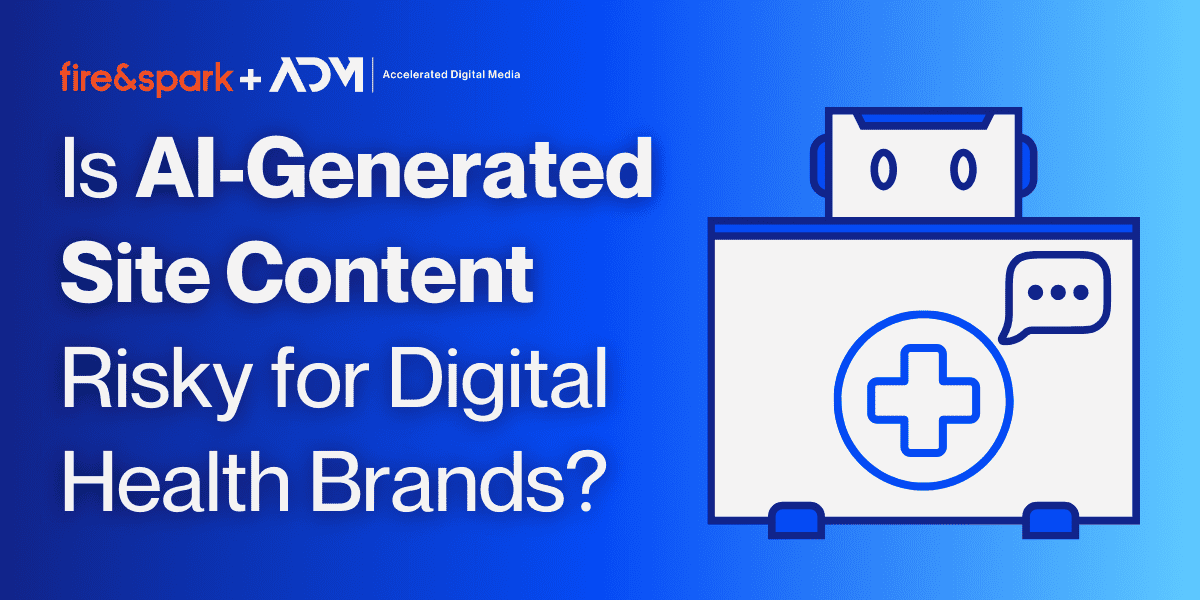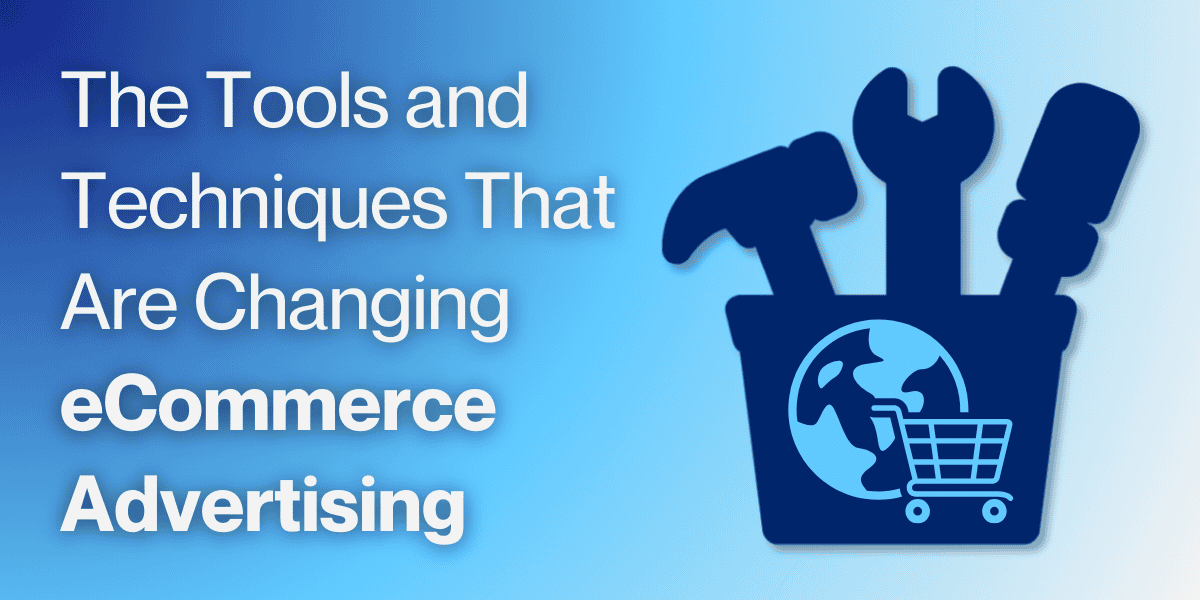Early in 2025, Meta introduced new policies that change how health and wellness brands can advertise on its platforms. After they were hinted at in late 2024, health advertisers had a brief leadup to learn what these rules would entail and how they may need to adapt.
Now that Meta’s new health policies are rolling out, the industry is getting its first look at what changes it needs to make. Based on our conversations with health and wellness advertisers, experts, and Meta representatives, we’ll use this blog to lay out the latest on how these rule changes are impacting brands and what they need to do to adhere to them.
What is Meta Restricting for Health Advertisers?
Meta is restricting health and wellness marketing from using certain event data to track conversions. That’s because pairing named conversion actions (like “appointment signup”) with Meta’s specific user information and powerful algorithms could generate protected health information (PHI), violating platform policies while creating legal liability.
First off, health brands (and their advertising partners) should always:
- Understand how HIPAA defines PHI
- Account for any possibility that data generated in their Meta Ads strategy could contain PHI
In the past, Meta’s health and wellness policies have consistently warned advertisers not to transmit potential PHI through its platforms. But in recent years, the FTC has levied enforcement actions against health companies for their social media marketing practices and a few class action lawsuits have directly ensnared Meta. Leaving it up to the advertisers may not have been a tenable approach for Meta in the long term.
Now, Meta is categorizing advertisers into sensitive fields (like health and wellness) and preventing them from optimizing campaigns around health-related bottom-funnel conversions.
“In short, Meta is making it clear they don’t want sensitive data and are taking strict measures to block it,” says Adam Putterman, co-founder of Ours Privacy—a customer data platform (CDP) that specializes in helping healthcare companies stay compliant.
“Since most campaigns are optimized towards these types of events, health advertisers will need to drastically rethink and update their campaign structures,” Putterman says.
Who is Impacted and How?
Meta is taking a two-step approach to this policy: First categorizing health and wellness brands, and then assigning a level of restriction to their marketing capabilities.
Categorization
Meta defines its health and wellness category as advertisers “associated with medical conditions, specific health statuses, or provider/patient relationships (for example, a patient portal or wellness tracker for depression).” That’s broad, but it inherently covers:
- Disease- or condition-specific treatment, device, or app companies
- Mental and physical health providers
- Telehealth and teletherapy brands
- Pharmacies and online pharmacies
…though it may leave unclear the status of companies like supplement brands or other health-adjacent businesses.
Restriction
Within the health and wellness category, advertisers may see differing levels of event restriction based on what actions they enable:
- Fully restricted entities may include healthcare provisioning properties: patient portals, secured app sections, and app domains.
- Partially restricted entities may include most standard consumer-facing web properties such as healthcare marketing sites, landing pages, and lead forms.
According to Putterman, the majority of US-based healthcare companies he has seen have fallen into the “partially restricted” category. The restrictions for EU-based companies have been “much more widespread and severe.”
Relevant companies need to check their categorization status and their restriction level. ADM has heard from companies that may not meet the criteria for full restriction but have been flagged for it, some of which have appealed to be moved down to partial status. Likewise, health and wellness-adjacent brands should be on the lookout to see if they have been flagged and be ready to appeal if they are confident that they have been miscategorized.
Staying Compliant with New Healthcare Marketing Rules
Putterman emphasizes that health and wellness brands need to define their own health data framework based on HIPAA and other privacy laws.
“I think many brands are rushing to find workarounds,” Putterman said. “It’s important to start with a strong, internally-defined view of where and what in your funnel is health data, guided by HIPAA and relevant state laws, not just Meta’s policies.”
He noted that many companies have found success using compliant customer data platforms or specific Meta Conversion API (CAPI) setups that obfuscate event actions and redact PHI. While partially-restricted entities can still utilize CAPI, those labeled “fully restricted” can’t transmit any necessary data to Meta, greatly limiting how they can build and deploy marketing campaigns.
“Practically, that means shifting away from pixels and standard events,” he says. With an informed approach, he says advertisers see minimal performance disruptions—and he expects that trend to continue.
Many health brands don’t have those capabilities in-house, however—and others may be concerned about current practices and feel compelled to have them checked out and fixed quickly. Putterman says those brands should consider working with healthcare marketing agencies and CDPs. It can be a practical investment: in addition to legal compliance, other digital marketing platforms may begin to also tweak their policies towards health advertising.
“With pressure from the FTC and OCR, expanding state privacy laws, class action lawsuits, media attention, and now Meta’s restrictions, it’s unlikely the tide will reverse,” Putterman said. “We expect other platforms to follow suit, accelerating a shift toward CAPI, custom events, and privacy-informed marketing practices. It’s a new era.”
If you have questions about healthcare marketing don’t hesitate to reach out to the ADM team:
Contact
"*" indicates required fields
DISCLAIMER
This content is for informational use only and is based on analysis of current platform policies related to health advertising. These policies are subject to change following this publication date. If you require legal advice about any of the matters discussed above, ADM recommends seeking a healthcare privacy attorney.




